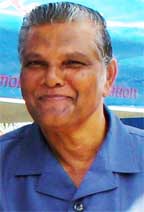By Andre Haynes
With strong emphasis on his reputation for quality leadership, Major General (rtd) Joe Singh is being quietly pushed as the person to lead an opposition coalition at next year’s general elections.

Stabroek News was unable to speak with Singh directly; however, in response to a query at his office about his plans after stepping down as GT&T CEO, an aide told this newspaper that he said “he had no plans.” In May, Singh announced that he would be stepping down as CEO, explaining that he was prepared to enjoy his retirement. He noted that when he first took over as CEO, he had stated his intention to serve for two years but he has since gone on to hold the post for five years.
Singh, in addition to serving as army Chief of Staff, previously served as the Chairman of the Guyana Elections Commission as well as Executive Director of Conservation International until 2005. With current exploration of a possible combined opposition alliance to contest next year’s general election, Singh’s name has been mentioned as an attractive candidate to lead such a grouping. However, there has long been interest in him as a candidate for opposition parties, in the light of his leadership experience as well as the belief that he commands support across the ethnic divide.
According to results of a recent poll conducted by the Caribbean Development Research Services Inc (CADRES), Singh ranked fifth, behind President Bharrat Jagdeo, AFC leader Raphael Trotman, PNCR leader Robert Corbin and former PNCR Chairman Winston Murray, when respondents were asked to select their preferred leader.
A former opposition strategist said Singh’s name has always been “front and centre, [since] he has satisfied the criteria of being acceptable to everybody”. Meanwhile one of the leaders of an opposition party told Stabroek News that in diplomatic circles his name has been cropping up frequently. “I find it is in the air, again,” the party leader added, noting that Singh has a reputation for credibility.
Stabroek News was told that it has been suggested that the quality of leadership among the political parties does not instil great confidence among certain sections of the society. In this regard, Singh is seen as “less tainted” and a possible “wedge in the racial divide,” given his success in the military and his succeeding posts.
However, there is also some reservation about Singh being foisted on to the electorate. “I think, like the rest of us, he needs to be tested by the people and found to be truly worthy,” the party leader said, adding, ”any democratic process has to be blessed by the people and not left to any group that might be self-interested to present a name.”
Following ongoing talks among opposition parties that are exploring the possibility of a coalition approach to next year’s poll, there has been increasing talk about Singh as a consensus candidate, especially among some sections of the population who have been frustrated with the leadership within the opposition and the limited choice of candidates.
WPA co-leader Dr. Rupert Roopnaraine recently emphasised that a common work programme is crucial to any alliance, having noted the preoccupation with who would lead it. He said that for any coalition to succeed at the polls and in serving the populace it must agree beforehand on an economic, political and social programme around which the parties can unite. With such a programme in place, he noted, the question of a coalition government becomes easier.
He said the programme is crucial because it means that the coalition having agreed on it unanimously would be held to it. He said that among the primary objectives of the coalition should be how to deal with the “economic apartheid” in the country, describing it as the gap between the extremely wealthy and the poor. He added that the gap is currently the “widest I have seen in my life. … We have to bear in mind that we have to present the electorate with a real choice, a change from the present policies which in my mind are destructive… of our institutions for example,” he said.
He said it is important that parties unite as early as possible and work out the way forward for the country. Roopnaraine said this serves as the basis for any opposition coalition, adding that without this kind of focus it would hardly be a coalition and more a “shotgun wedding that is not going to work very well.”



